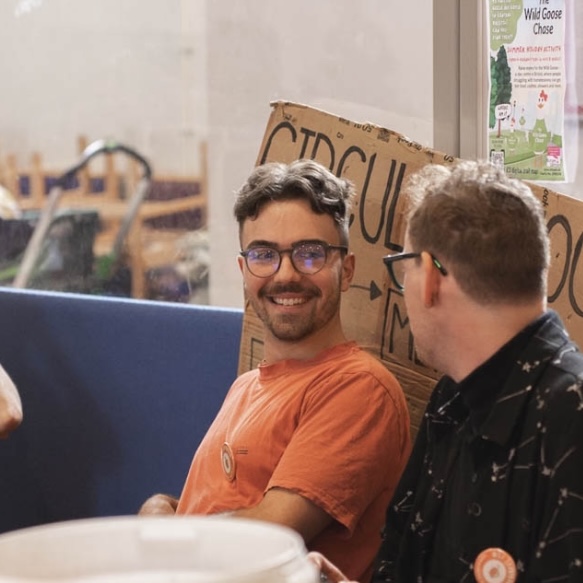Biochar in Bristol Gardens: Ancient Wisdom for Modern Soil Regeneration
- Alex Montgomery
- Mar 18, 2025
- 3 min read
Updated: Oct 13, 2025
At Generation Soil, we’re always searching for natural ways to regenerate Bristol’s soils, improve composting, and support a circular food system. One of the most powerful tools we use is biochar, a carbon-rich, porous material that transforms compost and soil health.
By adding biochar to living compost, we create a thriving underground ecosystem of beneficial microbes, enhance soil structure, and lock away carbon for centuries. What’s remarkable is that this isn’t a new innovation; it’s an ancient wisdom that’s finally being rediscovered.
What Is Biochar?
Biochar is a stable form of carbon created when organic matter, such as wood chips, crop residues, or food waste, is burned in a low-oxygen environment through a process called pyrolysis.
Unlike ash, which loses its structure, biochar retains a honeycomb-like form packed with microscopic pores. These tiny spaces store water, nutrients, and beneficial microorganisms, turning soil into a living, breathing sponge.
When mixed into compost or soil, biochar supports microbial life, improves fertility, and helps store carbon, making it one of the most powerful climate-positive soil amendments available today.

The Indigenous Roots of Biochar
The story of biochar begins thousands of years ago with Indigenous communities in the Amazon. They created a rich black soil known as Terra Preta, or “dark earth,” by mixing charred plant material, food scraps, and organic waste into the ground.
Unlike the poor, sandy soils that surrounded them, Terra Preta remains fertile even today, hundreds of years later. Scientists now recognise it as one of the earliest examples of regenerative agriculture, an approach that restores rather than depletes the earth.
By reintroducing these methods, we’re honouring Indigenous soil stewards and reviving a practice that connects carbon storage, food production, and climate repair.
How Biochar Enhances Living Compost
At Generation Soil, our compost is alive, filled with microorganisms, fungi, and beneficial bacteria. Biochar helps these organisms thrive and builds long-term soil resilience. Here’s how:
1️⃣ Boosts Microbial Activity
Biochar’s porous structure creates safe habitats for bacteria and fungi to multiply. These microbes break down organic matter faster and release vital nutrients for plants.
2️⃣ Improves Soil Structure And Water Retention
In Bristol’s compact urban soils, biochar prevents hardening, keeps air pockets open, and holds onto water. That means healthier roots, fewer floods, and less irrigation.
3️⃣ Locks Carbon in the Ground
While normal organic matter decomposes and releases CO₂, biochar remains stable for centuries. Each handful effectively removes carbon from the atmosphere, making it a key part of the climate solution.
4️⃣ Reduces Compost Odours And Emissions
Adding biochar absorbs methane and ammonia gases that cause smells and greenhouse emissions. It also stabilises nutrients like nitrogen and phosphorus, keeping compost balanced.
5️⃣ Improves Nutrient Cycling
Think of biochar as a nutrient bank; it holds onto minerals that might otherwise wash away, releasing them slowly to feed plants over time.

Why We Use Biochar at Generation Soil
Biochar plays a central role in our Bristol Living Compost Project and all our composting systems. By combining local food waste, wood shavings, and biochar, we create:
Regenerated soils rich in microbial life
Lower emissions and less landfill waste
Healthier compost that supports biodiversity
Circular, community-driven food systems
Every batch of Generation Soil’s Living Compost includes biochar to help turn Bristol’s food waste into a long-lasting soil solution for gardens, allotments, and farms across the city.

Biochar for Bristol’s Climate-Positive Future
Bristol’s gardeners and growers can take simple steps to be part of this regenerative story.
Add biochar to your compost heap or soil mix.
Choose locally made living compost enriched with biochar.
Join community composting hubs to reduce food waste.
By doing so, you’ll not only grow healthier plants, you’ll help store carbon, improve soil biodiversity, and support Bristol’s transition toward a circular, climate-resilient food system.
How You Can Get Involved
At Generation Soil, we’re building a community around soil health and regeneration. You can:
Join the Bristol Living Compost Project: turn your food scraps into living compost.
Book a workshop: learn how biochar and microbes build living soil.
Order Generation Soil living compost: perfect for gardens, planters, or allotments.
Together, we can regenerate our city, one compost bucket at a time.

Final Thoughts
Biochar reminds us that sometimes the most powerful climate solutions are the simplest: a handful of blackened wood that feeds life for generations.
At Generation Soil, we’re proud to continue this legacy here in Bristol, turning waste into fertility, microbes into resilience, and soil into the foundation of a brighter, greener future.




Comments